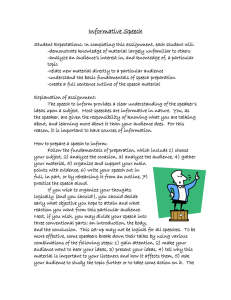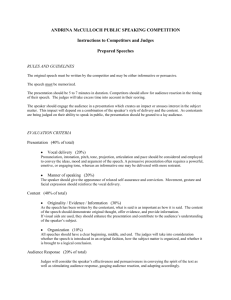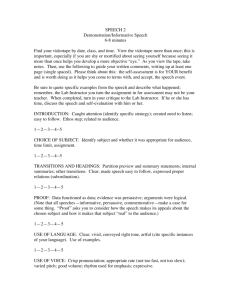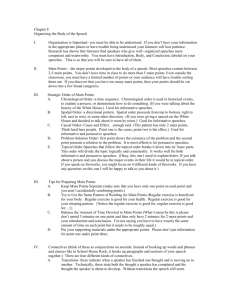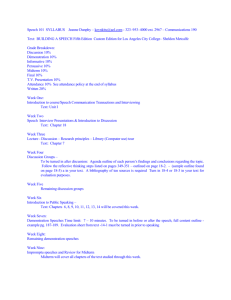COMM 1010: Introduction to Communication Instructor: Johnny Oh
advertisement
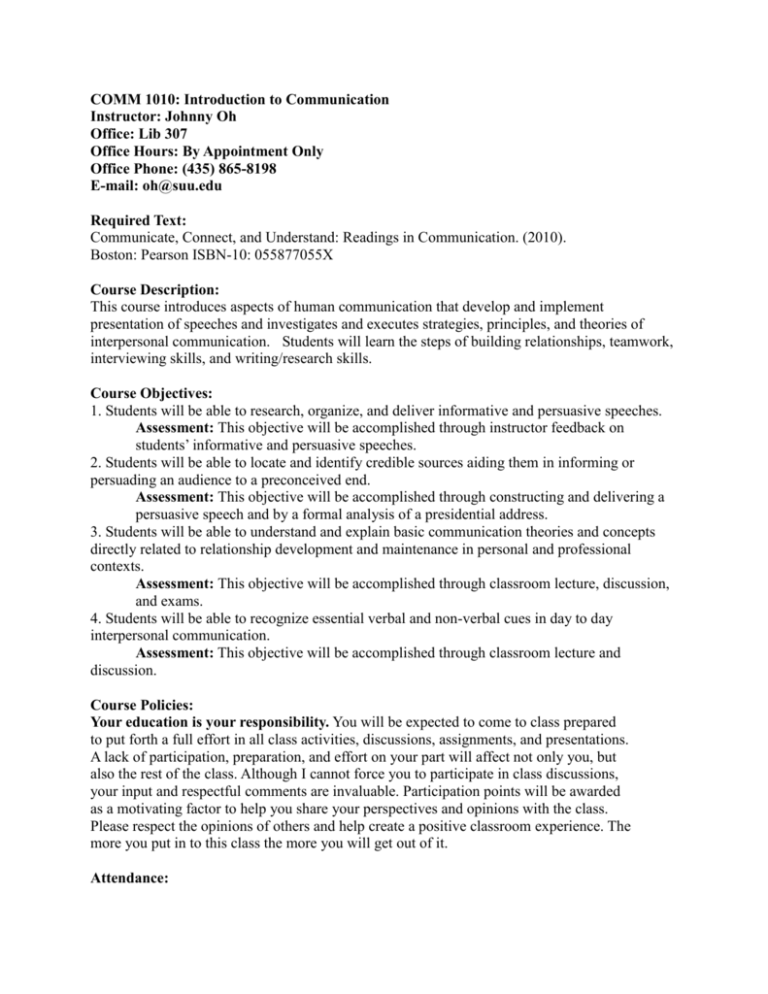
COMM 1010: Introduction to Communication Instructor: Johnny Oh Office: Lib 307 Office Hours: By Appointment Only Office Phone: (435) 865-8198 E-mail: oh@suu.edu Required Text: Communicate, Connect, and Understand: Readings in Communication. (2010). Boston: Pearson ISBN-10: 055877055X Course Description: This course introduces aspects of human communication that develop and implement presentation of speeches and investigates and executes strategies, principles, and theories of interpersonal communication. Students will learn the steps of building relationships, teamwork, interviewing skills, and writing/research skills. Course Objectives: 1. Students will be able to research, organize, and deliver informative and persuasive speeches. Assessment: This objective will be accomplished through instructor feedback on students’ informative and persuasive speeches. 2. Students will be able to locate and identify credible sources aiding them in informing or persuading an audience to a preconceived end. Assessment: This objective will be accomplished through constructing and delivering a persuasive speech and by a formal analysis of a presidential address. 3. Students will be able to understand and explain basic communication theories and concepts directly related to relationship development and maintenance in personal and professional contexts. Assessment: This objective will be accomplished through classroom lecture, discussion, and exams. 4. Students will be able to recognize essential verbal and non-verbal cues in day to day interpersonal communication. Assessment: This objective will be accomplished through classroom lecture and discussion. Course Policies: Your education is your responsibility. You will be expected to come to class prepared to put forth a full effort in all class activities, discussions, assignments, and presentations. A lack of participation, preparation, and effort on your part will affect not only you, but also the rest of the class. Although I cannot force you to participate in class discussions, your input and respectful comments are invaluable. Participation points will be awarded as a motivating factor to help you share your perspectives and opinions with the class. Please respect the opinions of others and help create a positive classroom experience. The more you put in to this class the more you will get out of it. Attendance: You are expected to attend every class period. Please show respect by being to each class on time. Your education is your responsibility; please take it seriously. If you miss class on a day that an assignment is due, you are still responsible to turn it in to me on time. If you miss class on a day you are scheduled to speak you will be unable to make up the speaking part of the assignment (outlines may still be turned in for credit). Exams must be taken on exam day unless previously discussed with me. If you know you will be absent for a certain class day, you need to contact me in advance. In addition to assignments due to be turned or newly assigned during your absence, it is your responsibility to copy notes or gather other information for the class you missed. Attendance will be taken sporadically throughout the semester and unexcused absences on these days cannot be made up. Exceptions for missing class or absences may be made in the case of documented illness, family emergencies, or school approved functions. Vacations, weddings, etc. are not considered emergencies. Situations will be dealt with on a case-by-case basis and I reserve the right to make the final judgment about excused absences. If you have any questions, please ask me. I understand that life keeps happening even while we are in school and I’ll work with you when possible. If you are late on a speech presentation day, please wait outside the door until you hear applause. Cell Phones/Laptops: Please be courteous and respectful with use of laptops and cell phones. Do not answer your phone, text, Google, play games, IM, surf the web, e-mail, check Facebook, blog, or do anything of this nature while in class. Although using laptops can enhance your personal learning experience, they can be a distraction to others. Laptops are not to be used in class while others are presenting. Cell phones should be kept silent or off while in class and should be put away. Please be courteous in using these devices. If laptops or cell phones become a distraction, students may be asked not to bring them. Late Work: You should plan to turn in your work when it is due. Late papers will receive a non-negotiable 10% grade reduction for each day it is late unless your situation falls under the excused category above. After one week, you are not eligible to receive any points for the assignment. Academic Integrity: Scholastic dishonesty will not be tolerated and will be prosecuted to the fullest extent. You are expected to have read and understood the current issue of the student handbook (published by Student Services) regarding student responsibilities and rights, and the intellectual property policy, for information about procedures and about what constitutes acceptable on-campus behavior. Examples of intellectual dishonesty include: Data falsification, data fabrication, deceitful alteration of collected data in a report from another student’s work, the use of purchased term papers, submitting work done by someone else, copying a phrase from an article or website without appropriate quotations and referencing, and using the same paper in more than one communication class. Anyone who cheats will earn an “F” for the assignment or the class based on the degree of the offense. Classroom Etiquette: The classroom should be an environment where students feel comfortable expressing disagreement with others (including the instructor). However, discussions should always be cordial, questions should be directed without hostility, and students should be able to raise issues without fear of reproach. If I feel that a student is creating a classroom atmosphere detrimental to the learning of other students, I will ask the student to leave and not return without first meeting with me outside of class to discuss the problem. All students are expected to come to class having read the assigned material and prepared and to engage in discussion. Failure to do so could result in a lower grade for the course. Student Support: In compliance with the Americans with Disabilities Act, please be familiar with the following statement. Students with medical, psychological, learning, or other disabilities desiring academic adjustments, accommodation, or auxiliary aids must contact the Disability Support Center, Room 205D, Sharwan Smith Center, phone (435) 865-8022. The Disability Support Center determines eligibility for and authorizes the provision of these services and aids. Emergency Management Statement: In case of emergency, the University’s Emergency Notification System (ENS) will be activated. Students are encouraged to maintain updated contact information using the link on the homepage of the mySUU Portal. In addition, students are encouraged to familiarize themselves with the Emergency Response Protocols posted in each classroom. Detailed information about the University’s emergency management plan can be found at http://www.suu.edu/emergency HEOA Compliance Statement: The sharing of copyrighted material through peer-to-peer (P2P) file sharing, except as provided under U.S. copyright law is prohibited by law. Detailed information can be found at http://www.suu.edu/it/p2p-student-notice.html Written Assignments: Written assignments should be typed as well as free from typographical and/or grammatical errors. The structure and flow or your writing will reflect the amount of time you spent on your outlines and your inaugural paper. The inaugural paper should be written using APA style and we will discuss this a little in class NOTE: Information contained in this syllabus, other than the grading, late assignments, and attendance policy may be subject to change with advance notice, as deemed appropriate by the instructor. Grade Breakdown: A 93% - 100% A- 90% - 92% B+ 87%- 89% B 83% - 86% B- 80% - 82% C+ 77% - 79% C 73% - 76% C- 70% - 72% D+ 67% - 69% D 63% - 66% D- 60% - 62% F Below 60% Point Breakdown: Assignment earned What is Communication? Group Presentation Informative Speech Informative Speech Outline Persuasive Speech Persuasive Speech Outline Outside Speaker Critique 1 Outside Speaker Critique 2 Attendance & Participation Quizzes Midterm Final exam Totals Schedule: Week Due 1 2 Day T TH T TH Date Points available Points 30 80 100 40 100 40 30 30 85 65 100 100 800 Topic 8/28 8/30 9/4 9/6 Introduction and Syllabus What is communication? / Ch. 1 Introduction Ch. 1 Introduction Ch. 2 The Self and Perception What is T 9/11 Ch. 2 The Self and Perception/Assign Groups and TH T TH T 9/13 9/18 9/20 9/25 Communication Paper due 3 Topics 4 5 Ch. 7 Group Communication Ch. 7 Group Communication/Ch. 3 Listening Group work day Group presentations Group member evaluations due 6 TH T TH 9/27 10/2 10/4 Group presentations Ch. 3 Listening Intro to Public Speaking T 10/9 Informative speaking lecture TH 10/11 Outside Speaker Critique 7 Speech topic due Informative speeches Speech outline due 8 9 10 T TH T 10/16 Informative speeches TH 10/18 Informative speeches/Midterm Review 10/23 Fall Holiday 10/25 Midterm T 10/30 Persuasive speaking lecture Speech Topic Due TH 11/1 Persuasive speeches Outline Due 11 T TH 11/6 11/8 Persuasive speeches Persuasive speeches Course evaluations (FYI, this date will probably T TH 11/13 11/15 Ch. 4 Verbal communication Ch. 4 Verbal communication change.) 12 Speaker Critique Due 13 14 15 16 T TH T TH T TH T 11/20 Ch. 5 Nonverbal communication 11/22 Thanksgiving Holiday 11/27 Ch. 5 Nonverbal communication 11/29 Ch. 8 Professional communication 12/4 Ch. 8 Professional communication 12/6 Final Exam Review 12/14 Friday 3-4:50pm Final Exam Assignments: All assignments are to be double spaced, typed, in 12pt Times New Roman font, with one inch margins. Headings should be single spaced and should include student name, date, and title of the assignment. Assignments are due in class and are to be turned in on or before the assigned due date. No emailed assignments will be accepted. References should be properly cited in 5th or 6th edition APA formatting. What is Communication? For this assignment students will be asked to take an introspective look at what they consider to be effective (or ineffective) communication. Students should define what communication means to them personally. By drawing on real life examples and experiences, students will describe and explain how communication works best, how communicators are inhibited, difficulties with communication, etc. Outside sources are not required but if used should be properly cited in APA style. A well-written paper will effectively explain why the student feels (or does not feel) that Communications 1010 is a valid option as a general education course. Length: should exceed two pages. Group Presentation Each group will be asked to give a 15 minute presentation on a topic previously chosen by the class. Group members will be randomly assigned approximately one week before presentations are given. Content and composition of each presentation is largely up to the group’s discretion but should be tasteful. Presentations should be supplemented by visual aids and all group members should plan to present for equal amounts of time. The purpose of this assignment is to learn and understand the importance of effective group communication and how it can affect a group’s overall performance. Group member evaluations will be turned in and will contribute to the overall group’s grade as well as each individual’s grade. Groups are encouraged to meet with the instructor prior to presentation day with any concerns or questions. A portion of the grade for this assignment will be based on a two-four page reflection paper about the experience. Using specific principles from the chapter students will evaluate the effectiveness of their group, areas for improvement, and group strengths or weaknesses. More details about this assignment may be discussed in class. Informative Speech Students will be required to research, prepare, and deliver a 4-6 minute informative speech on a current topic of political or social significance of their choosing. Speech topics will need to be approved no less than one week in advance to receive full credit. Creativity is encouraged. You will be required to stay within the 6 minute time frame so speeches should be well practiced. Visual aids of the student’s choosing are required for full credit on the speech. At least two credible sources must be used and cited during the speech and should appear in the reference section of your outline (in proper APA style). Students will create a full sentence outline to be handed in on the day of the speech. Students may use notecards or speaking aids during the speech, though these must be turned in with the outline. Persuasive Speech Students will be required to research, prepare, and deliver a 5-7 minute persuasive speech on a current topic of political or social significance of their choosing. The topic may be the same as your informative speech or you may opt for a new subject. Topics must be approved no less than one week in advance for full credit. Your goal in this address is to attempt to change or alter the audience’s thinking about a topic or move them to some specific action. You will be graded on structure, evidence/reasoning, and delivery of your speech, not on whether or not your audience was persuaded. You will be required to turn in a full sentence outline they day you speak including a reference page of at least three credible sources (cited in proper APA format). Visual aids of the student’s choosing are required. Students may use notecards or other speaking aids during the speech which will be turned in with the outline. Outside Speaker Critique Becoming a proficient speaker includes being able to evaluate the efficacy of other public speakers. Students will be asked to attend or view a speech of their choice given in a public setting outside the classroom. In a two to four page paper, students will evaluate the speech, the speaker, and how effective the speech was. Using constructive criticism, students will determine the speaker’s strengths and areas for improvement. Religious, political, or other speeches are acceptable however critiques should always remain objective focusing primarily on the speaker specifically rather than the speaker’s topic. Speaker critiques may be turned in at any point in the semester before the assigned due dates. Each student should complete two speaker critiques during the semester. Attendance & Participation Attendance and participation points will be awarded to those students who show they are putting forth a full effort in this course. Occasional short assignments, worksheets from the class workbook, in-class activities, etc. may all be used to take attendance or judge participation. These points are designed to reward you for your efforts. Tests & Quizzes Tests and quizzes will be used throughout the semester to encourage reading and concept comprehension. Class members will be forewarned of quizzes at least one class period in advance. Questions for both tests and quizzes will generally be multiple choice, short answer, fill in the blank, essay, etc. and will be based on both the book readings and class discussions. Point values for quizzes will be determined as the semester progresses: the less you read the more quizzes we’ll have. In order to do well on exams and quizzes you will need to be up to date on reading, class notes, and in-class discussions.

